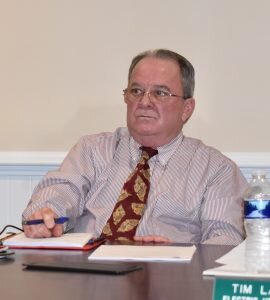By Morgan Pilz, Staff Writer
(Jan. 16, 2020) The Coastal Association of Realtors sent a letter to the Planning Commission on Wednesday, Jan. 8, asking the town to reconsider its ban of short-term rentals or Airbnbs in Berlin’s residential neighborhoods.
The letter from association President Joe Wilson argued that a property owner “has the core right” to lease or rent their property and cited citing several court ruling purporting to uphold that right.
“Berlin may be a great place to raise a family, but it also the recipient of Budget Travel’s “Coolest Small Town in America” designation and a destination for tourists,” the letter reads. “The dynamic of the family vacation is changing. The modern tourist is unable to take a weeklong vacation and needs affordable options. The surge in popularity of rental platforms that provide short-term options should not be disregarded by a popular tourist destination like Berlin.”

Dave Engelhart
During the Planning Commission meeting on Wednesday, Jan. 8, Planning Director Dave Engelhart offered his thoughts on the matter.
“Internally we’ve started to pull stuff together,” he said. “My thoughts are that we would allow [short-term rentals] in the single-family residential districts with owner-occupied homes in R-1 and R-2 districts. In the R-3 and R-4, the multi-family districts – or apartment districts – it would be allowed where it wouldn’t be owner-occupied.
“In other districts like the downtown district and the B-2 apartment or dwelling units on the second floor,” he continued. “You are allowed to have one unit on the second floor by code but not on the first floor. That would not change.”
Members of the audience argued against rescinding the ban, citing concerns such as noise pollution, illegal rentals and cars parking in other people’s driveways.
Board member John Barrett agreed as he questioned the town’s ability to police the rentals to ensure they were following code.
“Every R-1 home is supposed to have one [family or single person] dwelling in it and they’re not,” Barrett said. “How do you police [it]?”
Engelhart assured the board that they are trying to “preserve the integrity of R-1 and R-2 districts.”
The answer is that the residents will have to be the ones who police the rentals by reporting violations and registering complaints, he said.
Board member Matthew Stoehr, saw an upside of allowing short-term rentals.
“We are honing on the really bad ones,” he said. “Uber got a lot of the same discussions when they came out because, ‘How dare they attack the taxi industry’ and a whole discussion happened. I know personally when I’m in an Uber after a long night, I’m very respectful because it is a person’s private property.
“In Airbnb’s, you’re in someone’s private home,” Stoehr continued. “There’s a lot more respect for someone’s private home versus when you’re in a hotel room. I’ve been looking at some other counties have done … basically you had to have a license in order to do and there were inspections. But there were huge fines if there was a problem.”
Stoehr admitted he was not sure how to track down individuals who are violating the code but suggested it could be something that could be discussed.
Berlin Mayor Gee Williams said he believes the types and location of short-term rentals should be established in the town’s code before any actions are taken.
“I think that it’s irresponsible if we don’t have any regulations on the books whatsoever,” Williams said. “The thing that’s possibly being overlooked here is Berlin is a destination community. We’d love to have guests here during the day and the evenings, but we’re not a resort so I think that it’s not the wisest course for us to adopt the same wording or meaning that is appropriate for a major coastal resort.”
That does not mean he believes the ban should be set in stone, however.
“I think we can come up with something that’s balanced and fair but also protects the genuine quality of life and attraction Berlin has become over decades,” he said. “First thing is for the planning commission to make a recommendation to the mayor and council and then for us to consider those recommendations and to tweak them if we feel it’s necessary.”
